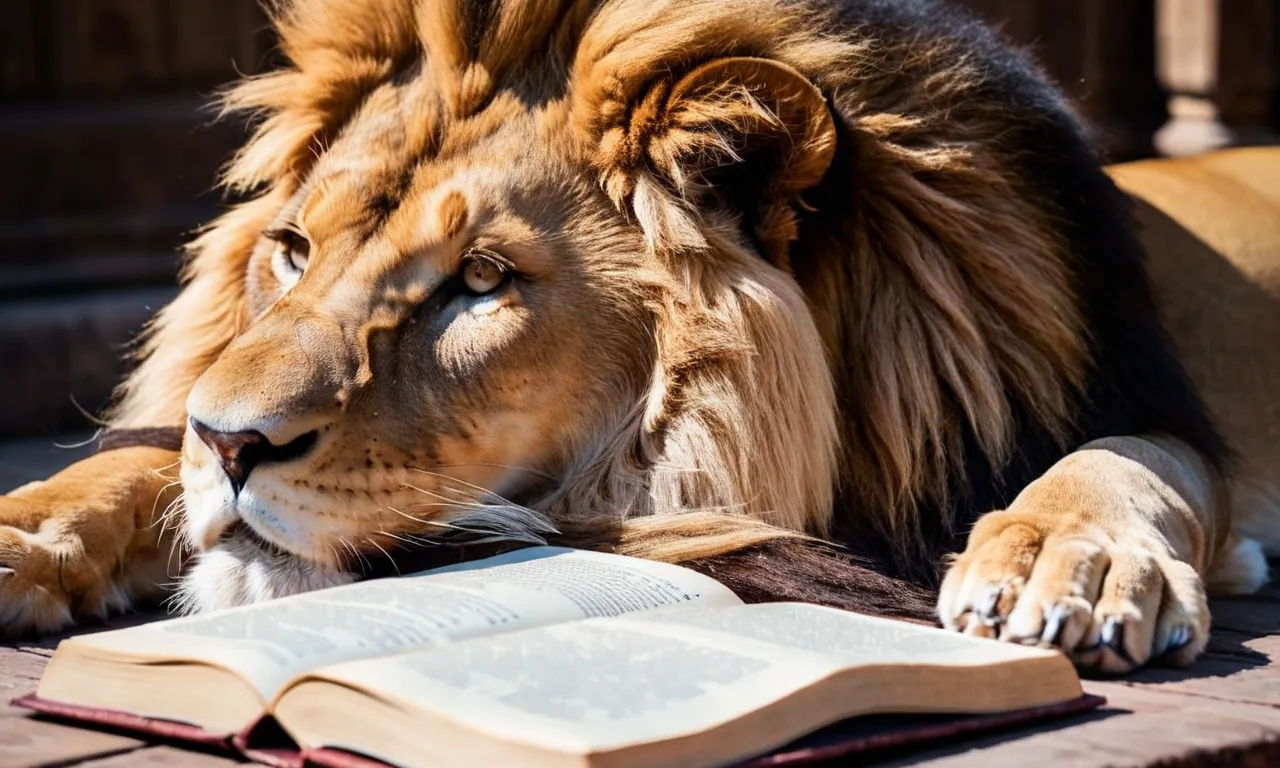What Does The Bible Say About Lions?
Lions have captured the human imagination for millennia as kings of the jungle and fearsome predators. Their strength, power and ferocity have led people to both revere and fear them throughout history.
If you’re short on time, here’s a quick answer to your question: The Bible contains over 30 references to lions, portraying them as dangerous beasts but also using them symbolically to represent qualities like strength, courage, and ferocity.
Key Bible passages describe encounters with lions and use lion imagery in prophetic visions.
In this comprehensive article, we will examine the many biblical references to lions, looking at what these passages say about the nature of lions and analyzing the symbolic meaning behind lion imagery in the Bible.
Physical Descriptions of Lions in the Bible
Lions as Dangerous Predators
The Bible depicts lions as fearsome predators that pose a serious threat to humans and livestock. In 1 Peter 5:8, the devil is compared to a “roaring lion looking for someone to devour”, illustrating the lion’s reputation as a vicious hunter.
Proverbs 22:13 warns against the “lion outside” that can kill the unwary, emphasizing the danger lions posed near ancient settlements.
Specific accounts reinforce the formidable nature of lions. The disobedient prophet killed by a lion in 1 Kings 13:24-26 highlights how lions preyed on vulnerable humans. Samson’s brutal retaliation against the lion that attacked him shows that even strong men feared lions (Judges 14:5-6).
The prophet Daniel’s miraculous survival after a night in a den of lions further demonstrates how unusually dangerous lions were considered (Daniel 6:16-22).
Lions as Symbols of Strength and Power
Though feared, lions were also respected as symbols of strength and royalty in Scripture. The tribes of Judah and Gad both used lions on their standards (Numbers 2:2-3). This association of lions with tribal power and authority continues in Revelation 5:5’s depiction of Jesus as the prophesied “Lion of the tribe of Judah”.
The Bible also connects lions with kings and rulers. Proverbs 28:15 illustrates the terror of a “roaring lion” who rules unjustly over the helpless. Ezekiel 19:1-9 uses lions as symbols for the strong kings of Judah.
Daniel’s vision of four beasts depicts Babylon, Persia and Greece metaphorically as different predatory cats, with the lion representing Babylon’s fierce strength (Daniel 7:1-8).
Though undoubtedly dangerous in Scripture, lions thus served as complex symbols of both judgment and strength, not merely simple predators. Their power and dominance led to their association with royalty and authority.
Encounters with Lions in Biblical Stories
Daniel in the Lions’ Den
The story of Daniel in the lions’ den is one of the most well-known bible stories about a man’s close encounter with lions. Daniel was thrown into a den of hungry lions by King Darius after he refused to stop praying to God (Daniel 6:16).
However, God closed the mouths of the lions and protected Daniel from harm (Daniel 6:22). This amazing demonstration of God’s power and protection allowed Daniel to emerge unharmed.
Samson Fights a Lion
In Judges 14, Samson is traveling alone when a young lion attacked him. But the Spirit of the Lord empowered Samson to grab the lion with his bare hands and kill it. Later when he passed by the same place, he saw that bees had made honey in the carcass.
Samson’s feat showed that God gave him supernatural strength to overcome dangerous animals like lions.
David as a Lion Fighter
As a young shepherd boy, David fought both a lion and a bear while protecting his sheep with just his staff and sling (1 Samuel 17:34-36). This helped build his reputation for bravery. It also foreshadowed how he would later slay the Philistine giant Goliath.
Just as God helped him triumph over dangerous beasts, he gave David courage to stand up to Goliath despite overwhelming odds.
Lions as Symbols in Prophetic Bible Imagery
Lions Representing the Tribes of Israel
In the Bible, lions are sometimes used to symbolize the 12 tribes of Israel. For example, in Genesis 49, Jacob blesses his 12 sons and compares some of them to lion cubs. Judah is called “a lion’s cub” and it’s prophesied he will hold the scepter, picturing leadership and kingship.
This became true as the tribe of Judah led the nation and produced Israel’s kings like David. The lion imagery conveys strength, power and sovereignty.
The Lion of Judah
Building on the symbolism of Judah as a lion cub, Jesus is referred to as the “Lion of the tribe of Judah” in Revelation 5:5. This connects Christ with the kingly line of David, implying his power and authority.
It’s a reflection of Jesus as majestic King over God’s people. Throughout Revelation, the lion also signals ultimate victory despite difficult circumstances for God’s faithful people.
Lions in Revelations and Other Apocalyptic Writing
Visions in Revelation and other apocalyptic biblical books like Daniel contain unusual imagery, often involving animals. The lion appears several times, portrayed as vicious, dangerous and destructive.
But though fearsome, these pictures ultimately demonstrate God’s sovereignty and justice triumphing over the schemes of oppressive earthly powers.
For example, in Revelation 9, monstrous horses with lions’ heads bring plagues, and in Revelation 13, the beast with seven heads resembling a leopard, bear and lion has authority to wage war against God’s holy people.
Daniel sees beasts arising from the sea, including one like a lion with eagle’s wings. Though disturbing, these lions and hybrid animals symbolize the limitation of earthly regimes’ power compared to the eternal might of God and His Kingdom.
The Nature of Lions According to Biblical Descriptions
Ferocity and Viciousness
Lions are depicted throughout the Bible as ferocious and vicious beasts. In Psalms 7:2, David cries out to God for deliverance from his enemies, who are described as “tearing my soul like a lion”. This highlights the destructive potential of lions’ powerful jaws and sharp teeth.
Proverbs 28:15 illustrates the danger of wicked rulers, stating that “a roaring lion and a charging bear is a wicked ruler over a poor people.” Here, the lion epitomizes the brutal nature of merciless leadership.
There are several accounts of lions killing people in the Bible. One of the most famous is in 1 Kings 13, where a prophet disobeys God’s command and is killed by a lion. The lion stands over the man’s corpse and does not permit anyone to move his body, showing the lingering threat even after attack.
The image is one of a deadly beast guarding its latest victim.
Symbolic Connections to Satan and Evil
Lions are linked to Satan and evil forces in a symbolic sense throughout scripture. 1 Peter 5:8 famously states “Be sober-minded; be watchful. Your adversary the devil prowls around like a roaring lion, seeking someone to devour.”
This verse paints a picture of Satan stalking about seeking opportunities to destroy souls, like a hungry lion hunting prey. It highlights the stealthy yet terrifying nature of the lion on the attack.
Other passages, such as Psalm 22:13, use similar lion imagery to depict enemies of God’s people: “they open wide their mouths against me, like a ravening and roaring lion.” And Psalm 57:4 states “My soul is in the midst of lions; I lie down amid fiery beasts – the children of man, whose teeth are spears and arrows, whose tongues are sharp swords.”
Here, evil men are compared to lurking predators waiting to consume the righteous.
Associations with Kings and Rulers
Lions are connected to royalty and sovereign leadership in the Bible. In Genesis 49, Jacob blesses his son Judah, stating “The scepter shall not depart from Judah, nor the ruler’s staff from between his feet, until tribute comes to him; and to him shall be the obedience of the peoples.”
This prophecy associates the tribe of Judah with kingly authority, represented by the scepter and staff. Later, this blessing finds fulfillment when David and his descendants – the lion tribe of Judah – become kings of Israel.
One of the most prominent biblical kings is Daniel, who is thrown into a den of lions yet miraculously survives unscathed. This account in Daniel chapter 6 illustrates God’s power to deliver his servants from harm.
It also connects lions with royal condemnation since in ancient Near Eastern kingdoms, the lion’s den was used as capital punishment reserved for high-ranking officials.
So in scripture, lions signify both messianic kingship through the tribe of Judah and Jesus Christ as the “Lion of Judah”, as well as the fearsome judgment on earthly rule and authority when it grows tyrannical or resists God’s sovereign reign.
Practical Takeaways for Modern Readers
Learning Bravery from Lion Imagery
Lions are often used throughout the Bible as symbols of strength, power, and bravery. There are several stories featuring lions that can encourage believers to have courage in the face of adversity or spiritual battles.
For example, David had the bravery to protect his flock from lions as a shepherd boy (1 Samuel 17:34-36). Daniel demonstrated remarkable faith when he was thrown into a lion’s den and emerged unharmed (Daniel 6:16-23). And in Revelation, Jesus is called the Lion of Judah (Revelation 5:5).
He is the ultimate example of conquering through sacrificial love.
When we face challenges or fears, we can reflect on these lion stories and be reminded that God can give us courage. He wants us to persevere in faith, not be paralyzed by fear. We can call out to Him for boldness and strength when encountering spiritual warfare or intimidating situations.
Heeding Warnings About Spiritual Warfare
Though they can symbolize positive traits, lions are also used at times in the Bible to warn believers about very real spiritual enemies seeking to devour them. Verses such as 1 Peter 5:8 say, “Be sober-minded; be watchful.
Your adversary the devil prowls around like a roaring lion, seeking someone to devour.”
This reminds followers of Christ that they have an intelligent, scheming foe who wants to attack them subtly and undermine their faith. Believers must be alert and resist the devil’s attempts to instill fear or lure them into sin (James 4:7).
Walking closely with God each day, putting on His armor, and being guided by the Holy Spirit are key to overcoming these spiritual attacks (Ephesians 6:10-18).
Heeding the Bible’s warnings about lions as dangerous predators highlights the reality of spiritual warfare. But it also reassures believers that God has equipped them to stand firm and not be devoured if they humbly submit to Him.
Finding Reassurance in God’s Protection
Amid descriptions of lions as fearsome hunters, the Bible also contains assurances of God’s ability to protect His people from all harm – even from lions! For instance, when the prophet Daniel emerged unscathed from the lions’ den due to God’s deliverance, King Darius proclaimed, “the living God[…]rescued and saved” Daniel from the lions (Daniel 6:26-27).
Similarly, David reflected on how God guarded his flock from lion attacks as a shepherd (1 Samuel 17:37). And Psalm 57:4 praises God for delivering David from those “whose teeth are spears and arrows, whose tongues are sharp swords.” This theme of divine protection runs throughout Scripture.
For believers today, these passages are reminders that God is all-powerful and cares for His children. No matter what “lions” we may face – whether physical, spiritual, or emotional – we can trust God to be with us if we rely on Him.
He is able to save us and will guard our souls amid life’s jungle of dangers.
Conclusion
As we have seen, the Bible contains a wealth of references to lions, from dramatic stories of attacks and supernatural rescues to prophetic imagery infused with lion symbolism. These passages offer insight into the nature of lions while using them as symbols for qualities like courage, strength, ferocity, and evil.
For modern readers, the lion imagery in the Bible can inspire bravery in the face of adversity, warn against spiritual warfare, and reassure believers of God’s power to protect them, just as he saved Daniel from the lions’ den.
The king of beasts still captivates our imagination today, but Bible passages put these creatures in eternal perspective.








